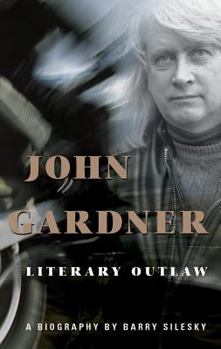John Gardner: Literary Outlaw
Select Format
Select Condition 
Book Overview
For a decade--from 1973 to 1982--John Gardner was one of America's most famous writers and certainly its most flamboyantly opinionated. His 1973 novel, The Sunlight Dialogues, was on the New York... This description may be from another edition of this product.
Format:Hardcover
Language:English
ISBN:1565122186
ISBN13:9781565122185
Release Date:February 2004
Publisher:Shannon Ravenel Books
Length:320 Pages
Weight:1.35 lbs.
Dimensions:1.3" x 6.1" x 8.7"
Related Subjects
Arts & Literature Authors Biographical Biographies Biographies & History Biography & HistoryCustomer Reviews
2 ratings
Shaggy & Unconventional Writer
Published by Thriftbooks.com User , 20 years ago
John Champlin Gardner grew up near Batavia, a rural community located nearly halfway between Buffalo and Rochester, New York. The tragic loss of his fearless brother Gilbert in a farming accident shaped his outlook on life and death, figured thematically in several of his life's works, and may have contributed to his own accident-prone and reckless nature. Inside and outside the classroom, shaggy and unconventional Gardner inspired legions of fledgling writers. Some of his more notable students included Raymond Carver, Charles Richard Johnson, and Richard Russo. Gardner was associated with a number of teaching institutions (Oberlin, Chico State, San Francisco State, Southern Illinois at Carbondale, Bennington, SUNY Binghamton) in his prolific but beleaguered career as a medievalist, fabulist, poet, novelist, librettist, playwright, literary critic, creative writing teacher, and translator. Grendel, his retelling of the Beowulf epic through the eyes of the monster, is considered one of his greatest works. October Light won the National Book Critic's Circle Award in 1976. Several books have analyzed Gardner's oeuvre and described aspects of his outrageous life but this folksy but gripping book is the first full-length biography. In 2000, Gardner's fiancée and former writing student Susan Thornton published On Broken Glass: Loving and Losing John Gardner, a memoir of their brief time together. To quote Gardner, "Spending a lifetime writing novels is hard enough to justify in any case, but spending a lifetime writing novels nobody wants is much harder." In 1982, the world of little literary magazines and writing workshops lost a giant as great as Grendel when Gardner died at age 49 in a motorcycle accident.
Heartbreaking
Published by Thriftbooks.com User , 20 years ago
As the story of a now unjustly neglected American author of great scholarly and artistic importance, this biography begins with an inspirational tone that, all too soon, turns heartbreaking and as affecting as anything in Gardner's own fiction. In many ways the life of John Gardner mirrors a struggle in the heart of modern America--there is something especially tragic about great idealism and intellectual conviction that fails to manifest fully in one's personal life.Silesky's book has a few failings, but the greatest of these is something that, most likely, could not be avoided with the present effort--and that is the book's length. For the most part, it seems that when he came to tough choices on what to include, Silesky stuck with his expressed theme, that of Gardner as "literary outlaw," a conflicted author who struggled against authority while also championing the ideas of "law and order." It cannot have been an easy thing to get the go-ahead for publishing even a book of moderate length about an author of whose novels all but one have dropped out of print in the 20 years since his death. However, squeezing the experiences of Gardner's 49 years into just over 300 pages makes for a very tight fit, especially when it comes to the details of certain relationships. For instance, we get a few references to the "several miscarriages" Joan, his first wife, had. But, with the exception of the final miscarriage, we do not get a real sense of the impact this had on the relationship. We also must wonder about Gardner's relationship with his two children when the family split, since we never learn if he had much contact with Lucy and Joel in the last years of his life. One especially craves more details of his association with other writers--his now-famous students, such as Charles Johnson and Raymond Carver, and the peers he knew socially, such Joyce Carol Oates and William Gass. Such details might have been elaborated if Silesky had curbed the attention paid, at key points in the biography, to Gardner's books and their critical reception, yet the context of these passages is important as well. Silesky has walked a difficult line structuring this book, and we can be grateful for his effort while also hoping that the book helps to fuel further Gardner scholarship and, perhaps, another biography or two sometime down the line. For the present, this book satisfies a long-felt void in the realm of Gardner scholarship.I know that all of Gardner's family is not happy with this book, but Gardner enthusiasts will find it irresistible. A word of warning, however. In the modern world we have perhaps an unprecedented number of opportunities to develop admiration for people we have never met, and Gardner has earned his fair share of devotees--in no small part due to that invaluable instruction book for writers, "The Art of Fiction." So, be warned that learning the details of Gardner's personal life may not be an entirely pleasant business. However il






